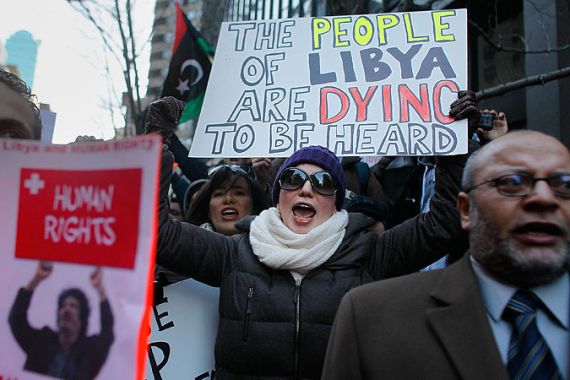Amnesty says Arab uprising ‘on knife edge’
The struggle for freedom has entered a decisive phase as brutal Arab regimes try to regain control, rights group says.

 |
| The Amnesty International has said internet fuelled the uprising in the Arab world [GALLO/GETTY] |
The situation in the Middle East is on a knife edge, with repressive governments fighting to regain control, Amnesty International, the global rights body, has said.
Dictators in the Arab world could crush uprisings against their iron-fisted rule using the same social media that have been credited with boosting the revolts, Amnesty warned in a new report on Friday.
It praised the role of websites such as Twitter and Facebook in fomenting the biggest revolt against repressive regimes since the end of the Cold War.
But the rights group cautioned that social networking sites which had helped cyberactivists outmanoeuvre the authorities in successful uprisings in Tunisia and Egypt were a double-edged sword.
“People are rejecting fear. Courageous people, led largely by youth, are standing up and speaking out in the face of bullets, beatings, tear gas and tanks,” Salil Shetty, the group’s secretary general, said.
“Not since the end of the Cold War have so many repressive governments faced such a challenge to their stranglehold on power,” he said in a statement. “But there is a serious fightback from the forces of repression.”
Which side wins depended on how governments behave but also on how the wider world supported the movement, Shetty told Reuters news agency.
“It could go either way in some of the countries. Libya is hanging in the balance, Syria is.”
The uprising in the Arab world demanding democratic change has brought an unprecedented opportunity for an improvement in human rights, the annual report on the state of the world’s human rights said.
Uprisings in North Africa and the Middle East this year have driven Tunisian leader Zine el-Abidine Ben Ali and Egyptian President Hosni Mubarak from power.
NATO has intervened in Libya after a revolt against Libyan leader Muammar Gaddafi while Syria, Yemen, Bahrain and other countries have been swept by protests.
Power of internet
Amnesty’s report highlighted the role of the internet and social networking sites such as Facebook and Twitter in helping activists to get around government suppression of free speech.
A battle for control of access to information and communications channels was under way as governments struggled to control social media networks, the report said.
Repressive governments such as those of Azerbaijan, China and Iran were trying to pre-empt any similar revolutions in their countries, it said.
Amnesty International said companies that provide internet access, mobile phone communications and social networking sites must respect human rights and not become the pawns of repressive governments that wanted to spy on their people.
Amnesty also drew a link between the protests in the Arab world and the release by internet site WikiLeaks of thousands of secret US diplomatic documents.
Support for Tunisia’s revolution from outside the country may have been strengthened by WikiLeaks documents showing other countries were aware of political repression in Tunisia but were doing little to urge change, it said.